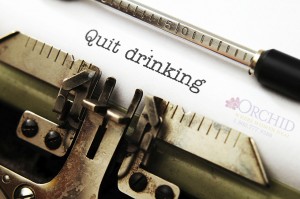How to Quit Drinking: Everything You Need to Know

If you feel like your drinking has gotten a little out of hand and you want to cut back, there are a few things you can do to achieve this. For whatever your reasons, maybe it’s health concerns, maybe you’re worried about how your drinking is affecting your appearance, or it’s interfering with your relationships or the hobbies you used to enjoy. Whatever the case may be, if you think you need to cut back, that’s a good indication that your drinking has gotten to be a little more out-of-hand than you would like it to be. So, here it is…
How to Quit Drinking: Everything You Need to Know:
#1. Be aware of your alcohol intake
Look at how much you’re drinking at home. On an average night, you might be imbibing more than you realize, especially if you like a couple of beers or glasses of wine while watching TV; it can be easy to lose track.
What you can do: Replace the alcohol in your fridge with soft drinks. Fortunately for you, these days the “soft” options are numerous and more exciting than they used to be. Grocery stores are packed with all kinds of cordials, smoothies and fizzy drinks.
#2. Remember that homemade drinks are stronger than bar-made ones
Be aware of this before you pour yourself your favorite cocktail into a glass the size of a gold fish bowl.
What you can do: Buy smaller wine glasses or an alcohol measure in order to make sure you don’t drink more than you intend to.
#3. Host dinner parties at your place
That way you can control the amount of alcohol at the part or whether it’s a completely alcohol-free evening.
What you can do: Afraid your guests will think it’s lame? Don’t fret. You can entertain them by mixing up a variety of non-alcoholic ‘mocktails,’ which can make for a fun party activity, in and of itself.
#4. Opt out of rounds
Going round-for-round with your friends or drinking buddies will encourage you to drink more drinks and drink them a lot faster than you’d like or realize.
What you can do: Forego rounds or go out with a smaller group of friends instead. Set a limit for yourself and tell your friends that that’s all you plan to drink. If they are good friends, they will help hold you accountable by cutting you off at the limit you previously set.
#5. Say ‘no’ to cocktails
They usually contain more alcohol than you might realize.
What you can do: Stick to a low alcohol content beer or wine or else a spirit with club soda.
#6. Pace yourself
Pounding a couple of drinks right away, at the beginning of the night will ruin your plans to cut back in two ways. One, you will more likely end up drinking more because, when you’re feeling buzzed, you are more likely to take risks and make poor decisions, therefore you will break your commitment to yourself to drink less and, two, you will find that your buzz wears off too soon, leaving you wanting more throughout the night.
What you can do: Spread out your drinks throughout the night. This will help even out your alcohol intake and make those alcohol units go further.
#7. Less is more
Try drinking smaller amounts in a sitting.
What you can do: Instead of pints, try sipping on halves, go for a bottled beer or if you are drinking wine, opt for a smaller glass.
#8. Go diluted
Drink your alcohol mixed with a non-alcoholic beverage mixed with it.
What you can do: Pretty self-explanatory. Cut your drinks with club soda or Coke or Ginger Ale, whatever you prefer.
#9. Alternate
Keep hydrated and cut back on your alcoholic intake by alternating between alcoholic beverages and non-alcoholic beverages, such as soft drinks or water.
What you can do: For each alcoholic drink you have, have a soda/water or two. This will slow you down while keeping you hydrated. And this is an added bonus because it will keep you from being hungover the next day.
If none of these work, then that’s an indication that you are dealing with more than a drinking problem. Having a physical and psychological dependence on alcohol means that you may also have one or more conditions related to that condition. Namely, a substance abuse disorder and perhaps alcoholism, as well. Here’s what to do and what not to if that is the case.
Keep Calm and Admit You Have a Problem:
First of all, if, when you try to quit drinking, you experience symptoms such as the shakes, sweating, anxiety, increased heart rate, dizziness, and/or hallucinations, this means you have become dependent and are experiencing what is known as alcohol withdrawal syndrome. This is a medical condition that should be taken seriously as it can lead to seizure, coma, or even death. Therefore, you shouldn’t go ‘cold turkey’ and you definitely shouldn’t try to stop drinking on your own and by yourself.
The good news is that help is available. There are alcohol detox programs that are medical programs which are staffed by medical professionals who are trained and well-equipped to treat your alcohol withdrawal in a safe manner while keeping you comfortable and respecting your privacy. Call us toll-free 1-800-777-9588 to speak directly with an Addiction Specialist today.
